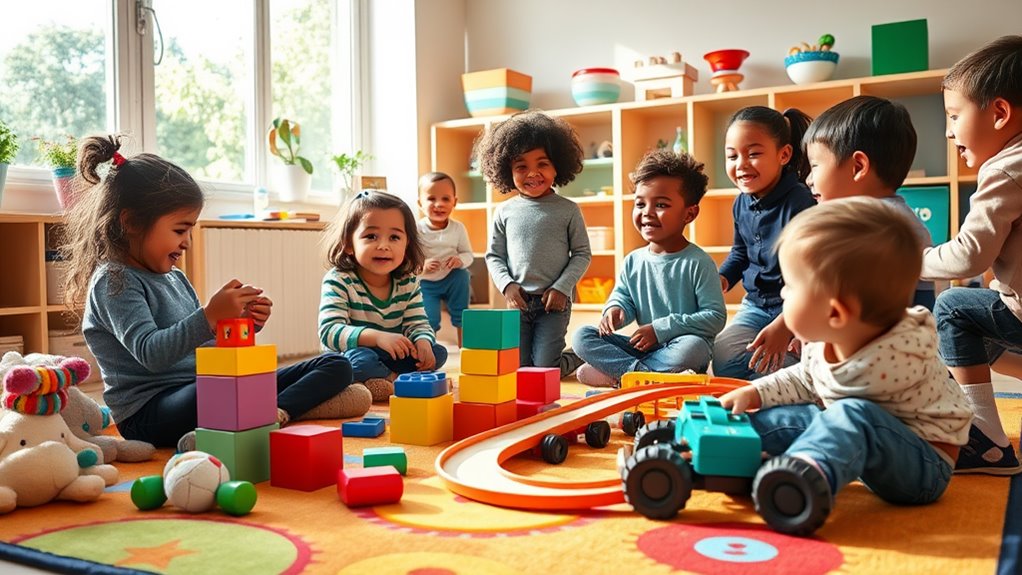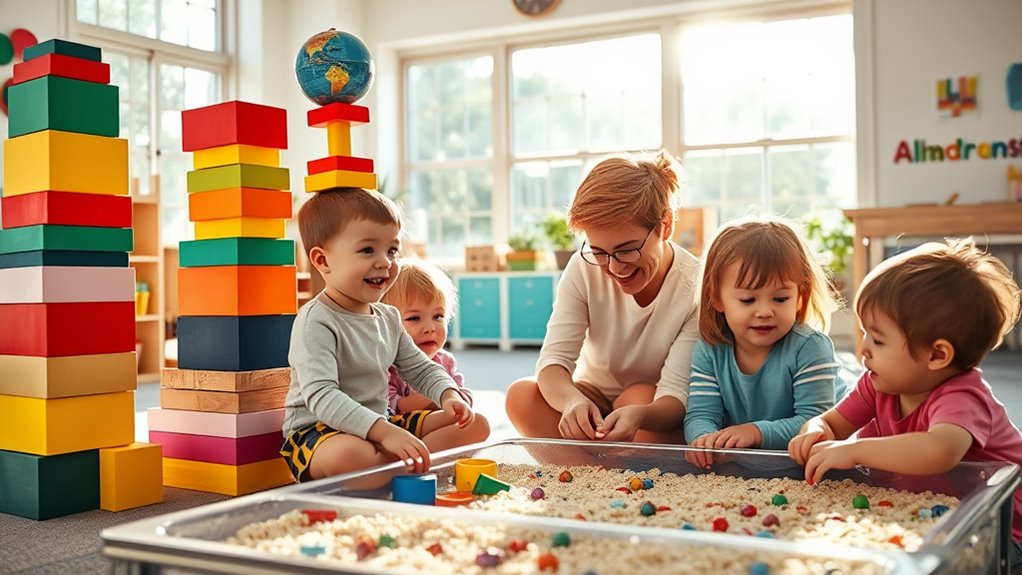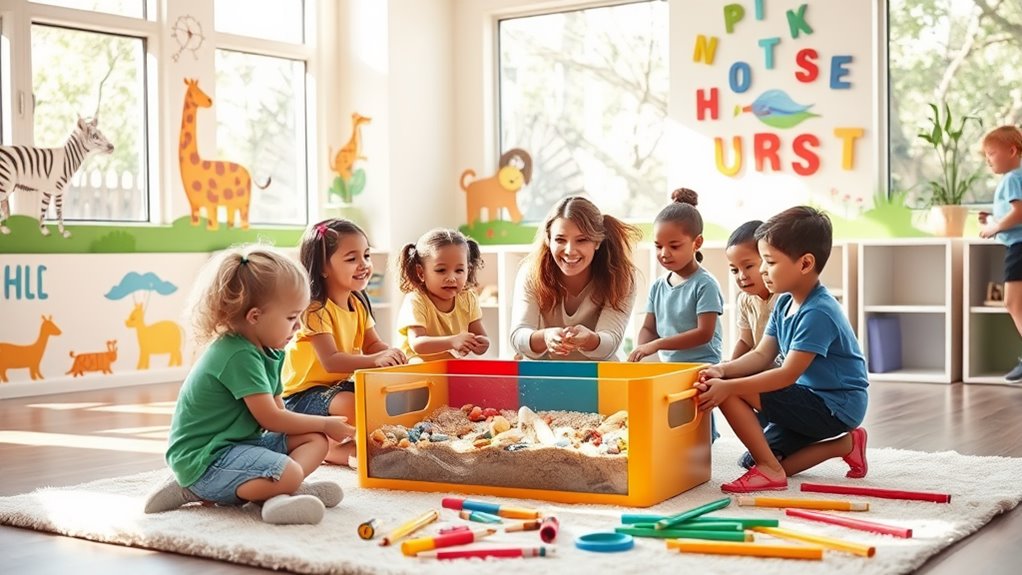Early Childhood Education Games That Teach and Entertain!
Early childhood education games are your secret weapon for blending learning with fun! They boost cognitive skills, nurture emotional growth, and improve social interactions—all while kids are playing. Try interactive online activities that spark creativity or get them moving with exciting physical games like scavenger hunts. From math puzzles to storytelling adventures, there’s a game for every learning style. Plus, these playful experiences help foster a love for knowledge that lasts a lifetime. Curious about how to implement these games effectively? Stick around, and discover more creative ideas to make learning an unforgettable adventure!
Key Takeaways
- Educational games enhance cognitive development, improving critical thinking, problem-solving, and memory retention in young children.
- Interactive online activities offer engaging, gamified learning experiences that cater to various learning styles and preferences.
- Creative physical games, like obstacle courses and scavenger hunts, promote movement, coordination, and teamwork among peers.
- Language development activities, such as story dice and role-playing games, stimulate creativity and enhance vocabulary and communication skills.
- Math and logic games, including puzzles and scavenger hunts, make learning essential math concepts enjoyable and memorable for children.
Benefits of Educational Games
When it comes to early childhood education, educational games are more than just playtime; they’re powerful learning tools that can spark curiosity and creativity. These games aren’t merely distractions; they play a crucial role in your child’s cognitive development. As kids engage with puzzles, memory games, or interactive storytelling, they’re honing critical thinking skills, enhancing problem-solving abilities, and boosting memory retention.
But it doesn’t stop there! Educational games also promote emotional growth. When children navigate challenges in a game, they learn to manage frustration and celebrate success, building resilience along the way. They practice teamwork and communication when playing with peers, developing social skills that are vital for their future interactions.
Moreover, the joy of learning through play fosters a positive attitude toward education. When your child associates learning with fun, they’re more likely to embrace new concepts and ideas, fueling a lifelong love for knowledge. So, as you consider ways to enrich your child’s learning experience, remember that educational games are not just fun; they’re essential stepping stones for cognitive and emotional development. Embrace these tools, and watch your child flourish!
Interactive Online Activities
Get ready to explore a world of fun learning platforms where your little ones can play while they learn! These interactive online activities are packed with skill-building games that make education feel like an exciting adventure. You’ll be amazed at how much they can grow while having a blast!
Fun Learning Platforms
A wealth of interactive online activities awaits young learners eager to explore and play! Fun learning platforms are revolutionizing how children engage with education, blending creativity with knowledge. You’ll find that these platforms often incorporate digital storytelling, allowing kids to craft their own narratives while enhancing literacy skills. Imagine your little one creating stories with vibrant characters and exciting plots—it’s a fantastic way to spark imagination!
Gamified learning is another exciting feature of these platforms. By turning educational content into games, children can immerse themselves in lessons without even realizing they’re learning! They’ll solve puzzles, complete challenges, and earn rewards, making every session feel like an adventure. You can encourage your child to tackle math problems or science concepts through interactive quizzes and engaging visuals that keep them captivated.
Don’t forget to explore various platforms that cater to different learning styles and subjects. As you dive into this digital playground, you’ll discover countless ways to support your child’s development while ensuring they have loads of fun. With these tools at their fingertips, your young learners will be well on their way to mastering essential skills in an enjoyable and dynamic way!
Skill-Building Games Online
Exploring skill-building games online opens up a world of interactive activities that sharpen young minds while keeping them entertained. These engaging online resources not only foster skill development but also make learning feel like play. You’ll find a treasure trove of games designed to enhance various abilities, from problem-solving to creativity.
Here are some exciting types of skill-building games you can dive into:
- Math Puzzles: Challenge your little ones with fun, interactive math games that make numbers come alive.
- Language Adventures: Explore games that boost vocabulary and reading skills through captivating stories and characters.
- Science Experiments: Discover virtual labs where kids can conduct safe experiments and learn about the world around them.
- Artistic Expression: Encourage creativity with games that let young artists paint, draw, and create their masterpieces.
These online activities are perfect for honing critical skills while ensuring your child has a blast. By incorporating these games into their routine, you’re setting them on a path to success, all while making learning an enjoyable experience. So, let the skill development journey begin!
Creative Physical Games
In the heart of playtime, creative physical games spark imagination and movement in young children. These games aren’t just fun; they promote essential skills through engaging outdoor exploration and movement activities. You can transform a simple space into an adventure zone where your little ones can run, jump, and play while developing coordination and balance.
One exciting game is the “Nature Scavenger Hunt.” Create a list of items for children to find outdoors, like leaves, rocks, or flowers. As they search, they’ll engage in movement activities, running and bending, all while connecting with nature. Another great option is “Obstacle Courses.” Use available materials like cones, ropes, or even hula hoops to design a course that encourages climbing, crawling, and jumping.
These games encourage social interaction, allowing children to collaborate and communicate as they play. Plus, they’ll learn to take turns and support one another, fostering teamwork. So, gear up for outdoor exploration and watch as your children thrive through creative physical games that entertain and educate!
Building Language Skills
After a day of energetic play, it’s time to turn that excitement into building language skills. You can nurture your child’s communication abilities through fun games that focus on vocabulary building and storytelling techniques. These activities not only entertain but also stimulate their minds and enhance their language development.
Here are some engaging ideas you can try:
- Story Dice: Roll the dice and create spontaneous stories based on the images. This encourages creativity and vocabulary expansion.
- Word Scavenger Hunt: Hide objects around the house that represent different words. When found, have your child describe them or use them in a sentence.
- Alphabet Soup: Cut letters out of paper and put them in a bowl. Have your child fish out letters and create words, fostering spelling and word recognition.
- Role-Playing Games: Encourage your child to act out different scenarios. This helps them practice language skills in a playful context.
Math and Logic Challenges
Ready to dive into the world of numbers? Math and logic challenges aren’t just fun; they’re essential tools for developing critical thinking skills in young minds. Engaging kids with math puzzles can transform the way they interact with numbers. Start with simple addition and subtraction games, then gradually introduce more complex problems to keep them challenged and excited.
Logic riddles are another excellent way to stimulate their minds. These brain teasers encourage kids to think outside the box and develop problem-solving strategies. Try presenting a riddle that requires them to use reasoning, like figuring out who has what based on a set of clues.
Mixing these activities into your routine can foster a love for learning while building a solid foundation in math. Create a math puzzle scavenger hunt where kids solve clues to find hidden treasures, or set up a logic riddle contest. Both approaches make learning dynamic and interactive, ensuring that children not only grasp essential concepts but also enjoy the process. So, gather those math puzzles and logic riddles, and watch as your little learners thrive in their journey through numbers!
Social Skills Development
When kids engage in cooperative play activities, they’re not just having fun—they’re learning how to share, communicate, and work as a team! Role-playing scenarios spark their imagination while teaching empathy and problem-solving in social situations. These playful interactions are crucial for building strong social skills that last a lifetime!
Cooperative Play Activities
Cooperative play activities are a fantastic way for young children to build essential social skills while having a blast together. These engaging experiences foster teamwork and help kids learn how to work together toward common goals. By participating in team building exercises and group problem solving, children develop empathy, communication, and conflict resolution skills that will serve them well throughout their lives.
Here are some exciting cooperative play activities you can try:
- Obstacle Course: Set up a fun challenge where kids must guide each other through various obstacles, promoting teamwork and communication.
- Treasure Hunt: Create a scavenger hunt that requires kids to work together to solve clues, enhancing their problem-solving abilities.
- Group Art Project: Encourage children to collaborate on a large art piece, allowing them to express creativity while learning to compromise and share ideas.
- Team Sports: Simple games like relay races or kickball teach the importance of teamwork and sportsmanship.
Role-Playing Scenarios
There’s something magical about role-playing scenarios that can ignite a child’s imagination while teaching vital social skills. As you dive into imaginative play, your child transforms into a doctor, firefighter, or even a superhero. This character exploration allows them to step into different shoes, fostering empathy and understanding of diverse perspectives.
When children engage in role-playing, they learn to negotiate, collaborate, and resolve conflicts. You might set up a playful market scene where your child practices asking for items, making change, or even bartering. These scenarios provide a safe space for kids to experiment with language and social cues, helping them navigate real-world interactions more effectively.
Moreover, role-playing encourages creativity and problem-solving. As your child encounters various situations during play, they develop critical thinking skills that are essential for their future. So, whether it’s a simple game at home or a structured activity in a classroom, these role-playing scenarios are invaluable tools for social skills development.
Tips for Game Implementation
Implementing games in early childhood education can really light up the learning experience for young children. To make the most of these engaging activities, it’s crucial to use effective game facilitation techniques and consider age-appropriate adaptations. Here are some tips to get you started:
- Know Your Audience: Understand the developmental stages of your students to tailor games that fit their abilities.
- Set Clear Objectives: Define what you want the children to learn from each game, whether it’s teamwork, counting, or problem-solving.
- Create a Safe Space: Ensure the environment is welcoming and encourages participation, so every child feels comfortable to join in.
- Be Flexible: Adapt the game rules or structure based on how the children respond. If they’re struggling, simplify; if they’re mastering it, add a challenge!
Frequently Asked Questions
What Age Group Is Best Suited for Educational Games?
Imagine a vibrant classroom filled with laughing children. For preschool readiness, ages 3 to 5 are perfect for educational games, as they enhance cognitive development, sparking curiosity and creativity while laying a foundational love for learning.
How Can I Adapt Games for Children With Special Needs?
To adapt games for children with special needs, use inclusive strategies and sensory adaptations. Incorporate tactile elements, visual aids, and flexible rules, ensuring every child feels engaged and empowered to participate in a fun learning experience.
Are There Any Recommended Apps for Educational Games?
You’ll love exploring educational apps with interactive features! Check game reviews for insights on user experiences. Popular choices like Endless Alphabet and Prodigy Math engage kids while ensuring learning feels like play, not work. Enjoy discovering!
How Much Screen Time Is Appropriate for Young Children?
You’ll find that screen time guidelines suggest limiting young children to one hour a day. Balancing playtime and screens nurtures healthy habits, helping them thrive while ensuring they engage with the world around them.
Can Educational Games Replace Traditional Teaching Methods?
While educational games can enhance learning outcomes, they shouldn’t fully replace traditional teaching methods. Game effectiveness lies in complementing structured lessons, ensuring a balanced approach that fosters engagement and mastery in young learners.




